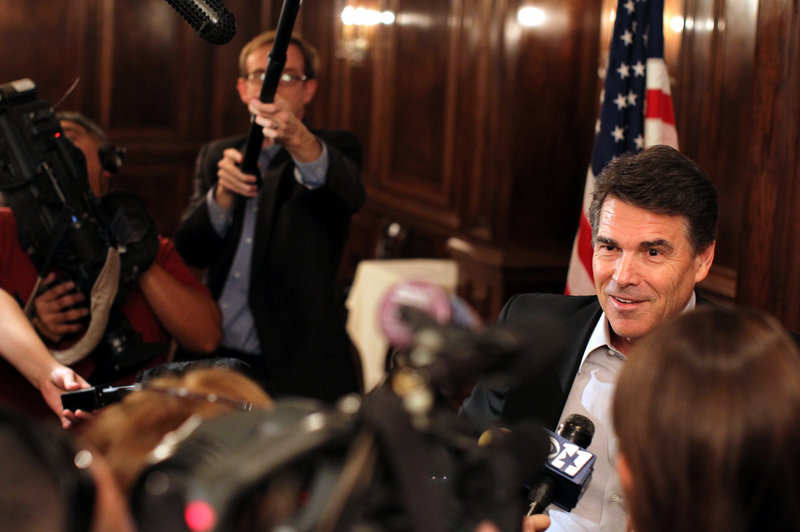It was a cold, blowing, fall day. The boys were gathered around the old stove at Hubbard Grain and Feed in the small central Texas town of Hubbard, and they had each added a slight nip to the morning coffee.
The chill left the room and their ranch-worn, creaking bones. As their temperatures rose, so did their tempers.
A few favored the re-election of the popular but controversial Texas commissioner of agriculture, Democrat Jim Hightower. There were folks back then, in 1990, who said ol’ Hightower might someday be president.
Most liked the up-and-comer, Republican state Rep. Rick Perry.
They challenged the grain store owner to phone a Texas newspaper publisher he knew. I answered the phone in my office at the Fort Worth Star-Telegram that early morning and got an earful of intense lobbying.
The majority of the ranchers around the stove liked Perry and said he could beat High-tower, whom they disliked.
“Endorse him!” they shouted.
They wanted to hear nothing of the newspaper’s editorial board and the formal process we followed in making election endorsements.
“Be a man!” they demanded. “Listen to the ranchers and endorse him.”
I acquiesced, not at all certain I could deliver. But endorsing Perry turned out to be easy. He was a charming and convincing candidate. Besides, I figured that if anyone knew who ought to be commissioner of agriculture, it would be some ranchers talking politics at the local grain and feed store.
Perry beat Hightower in a close race.
That’s when I began to realize that you can never take Perry for granted.
And after spending a number of years in Texas, first running the Star-Telegram for a national media chain and later my own newspaper company, I saw firsthand that it’s unwise to count out Gov. Perry on any front.
But Perry for president?
Perry has been coy about his intentions, but there have been rumblings of late that he might join the growing list of candidates who will compete for the Republican presidential nomination and the opportunity to challenge President Obama in the 2012 election.
Perry has beaten crowded fields before, most notably when he won re-election as governor in 2006 despite being challenged by what seemed like every notable resident of Texas except Dallas Cowboys owner Jerry Jones.
My favorite candidate in that election, by the way, was singer-songwriter-novelist Kinky Friedman, whose catchiest campaign slogan was his answer to the question of why he was qualified for governor: “How hard can it be?”
Being governor of Texas may not be that difficult but, as Kinky discovered, beating Rick Perry is close to impossible.
Perry prevailed in that 2006 contest with just 39 per cent of the vote. But a win is a win, as our own Maine Gov. Paul Le-Page can attest.
Rick Perry is a man of infinite surprises.
He was once a good Democrat. Serving in the grand tradition of rural Democrats in Texas, he was elected three times to two-year terms in the Texas House of Representatives.
Some who know him say that Rick was inspired to pursue a career in politics when he attended — at age 10 or 11 — the 1961 funeral of legendary Texas lawmaker Sam Rayburn, who had served as speaker of the House both in the state Legislature and in the United States Congress. With the likes of Rayburn and Lyndon B. Johnson as political role models, it made perfect sense that a young Texan in those years would sign on with the Democrats.
In 1989, though, Perry surprised voters and his party by announcing he had joined the Republican Party. That’s when he ran against and beat Hightower.
In 1998, he won the Republican nomination for lieutenant governor, which, in the governmental hierarchy of Texas, is an important and influential position. His opponent was a popular Democrat, John Sharp, who resigned as state comptroller to run for lieutenant governor.
Perry surprised everyone, beating Sharp and a Libertarian opponent, with 50.05 percent of the vote.
The rest would be history, if that were the end of the story. But it is not. He succeeded then-Gov. George W. Bush when Bush decided to run for president. Perry went on to be elected governor in his own right and is now the longest-serving governor in Texas history.
In his most recent election, just last year, Perry faced a primary challenge from Kay Bailey Hutchison, who had established a nationwide reputation and political following as a U.S. senator.
Hutchison garnered support from some powerful allies, including former Vice President Dick Cheney, real estate developer Ross Perot Jr. and a “Who’s Who” list of Dallas-area movers and shakers who provided her with support, advice and — most important — cash.
Hutchison was at one time thought to be a near shoo-in.
Make that “shoo-out.” Perry prevailed in the primary and was re-elected as governor.
My inclination would be to suggest that Perry is not likely to run for president and that, even if he does, he’s not likely to win.
But I don’t dare make such a suggestion. I can still hear the voices of those good ol’ boys at Hubbard Grain and Feed ringing in my ears.
Richard L. Connor is CEO of MaineToday Media, owner of The Portland Press Herald/Maine Sunday Telegram. A newspaperman for 40 years, he has served on two Pulitzer Prize for Journalism nominating committees. He can be reached at:
rconnor@pressherald.com
Send questions/comments to the editors.



Comments are no longer available on this story